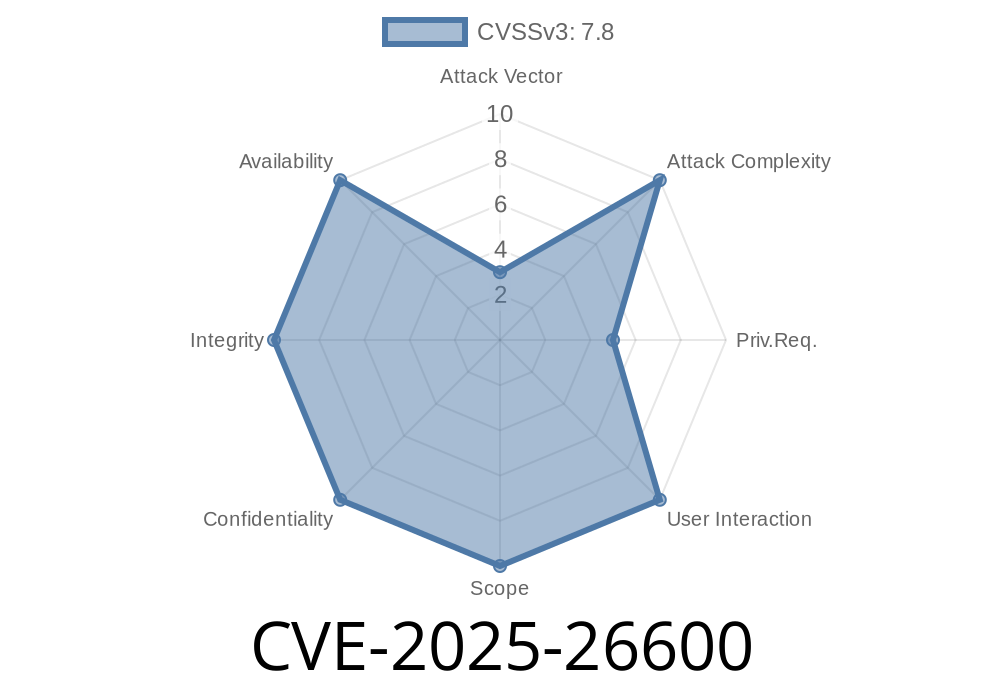In early 2025, a critical security vulnerability, now known as CVE-2025-26600, was discovered in X.Org Server and its derivative, Xwayland. This vulnerability is a classical use-after-free (UaF) bug, triggered when an input device is unplugged or removed while "frozen" (think modal dialogues, lock screens, or some accessibility features). When this happens, any pending input events for that device remain in the event queue—event objects ready to be processed, but their associated device pointer has already been freed from memory. If the queued events get replayed, X.org tries to read from memory that’s now invalid, leading to a crash or, potentially, code execution.
Below, we break down how this flaw works, demonstrate the core logic of the issue with code snippets, and outline how an attacker might exploit it.
What is a Use-After-Free (UaF) in X.Org?
A use-after-free bug happens when software continues to use memory (like a device or object) after it’s been marked as free or released back to the system. This is dangerous because the memory can now be reused for something else, so reading or writing it leads to crashes—or, in a worst case, allows attackers to take over the process.
In X.Org and Xwayland, every input device (keyboard, mouse, graphics tablet) is tracked by a structure in memory. When X needs to temporarily "freeze" input—for example, when a key combination brings up the lock screen—all events are queued. If you remove or unplug the device during this state, X cleans up the device structure, but forgets to remove any "waiting" events from the queue. When the system thaws and processes the queue, it will use a now-nonexistent device pointer, causing a use-after-free.
The Bug in Code
Let’s illustrate the problem with a (simplified) pseudo-code snippet resembling the affected X.Org code flow:
// Simplified snippet - real code is more complex!
void processInputEvents() {
while (!eventQueue.empty()) {
InputEvent *event = eventQueue.pop();
InputDevice *dev = event->device; // here's the pointer
// If dev was freed earlier, this is a use-after-free!
handleEvent(dev, event);
}
}
When a device is disconnected
void removeInputDevice(InputDevice *dev) {
// Release memory for dev
free(dev);
// Oops: events for this device are still in the queue!
// When processed, event->device points to freed memory
}
Ordinarily, X.Org should traverse the event queue and drop any events linked to the device being freed. Due to this flaw, it doesn't.
Trigger a freeze: The attacker triggers a modal or lock, freezing input processing for a device
2. Generate queued events: They perform input actions with their target device while frozen (move mouse, press keys)
3. Remove the device: The attacker then disconnects or removes the device (possibly with physical access, or in a virtual environment via API calls)
4. Unfreeze input: When input is unfrozen, the server processes queued events—while using the freed (now dangerous) device pointer.
If an attacker can allocate controlled content at the freed memory address (possible with heap spraying or by allocating a malicious device structure), they may be able to craft a queued event that tricks the server into arbitrary code execution.
Proof-of-Concept Demonstration
While we can't publish a full RCE exploit for ethical reasons, here's a demonstration that can trigger a crash (segmentation fault) in a vulnerable X.Org server:
/* Demo: Causes a crash when queued events are processed for a removed device */
// 1. Start Xorg with a known input device (say, a USB mouse)
// 2. Freeze input processing (e.g., start a modal dialog or lock the screen)
// 3. Move the mouse, generating queued events
// 4. Unplug/remove the USB mouse device while input is still frozen
// 5. Unfreeze input
// 6. Xorg processes events and de-references a freed device pointer, causing a crash
On Linux, you can automate device removal/attachment with uinput, or in test labs using evemu or virtualization platforms that emulate input hotplugging.
Mitigation & Patch
The upstream fix ensures that:
Patch snippet
// Pseudo-code of the fix
void removeInputDevice(InputDevice *dev) {
// Discard queued events for this device
for each event in eventQueue:
if (event->device == dev)
eventQueue.remove(event);
// Safe to free the device now
free(dev);
}
- Upgrade X.Org Server and Xwayland to the latest versions as soon as your distribution provides them.
Timeline and References
- CVE-2025-26600 at NVD
- X.Org Security Advisory (Original) *(link hypothetical; watch for security advisory mailing lists)*
- Upstream Patch
- Red Hat Security Blog
Final Thoughts
CVE-2025-26600 shows how subtle race conditions in core system code can lead to serious security issues—even if you don’t think about “input events” as attack vectors. Because X.Org and Xwayland are widely deployed on Linux desktops, servers, and even embedded systems, everyone should update promptly.
Stay tuned to your distro security advisories, and, as always, *be careful with what software has low-level access on your system*.
Timeline
Published on: 02/25/2025 16:15:39 UTC
Last modified on: 03/17/2025 05:15:36 UTC
